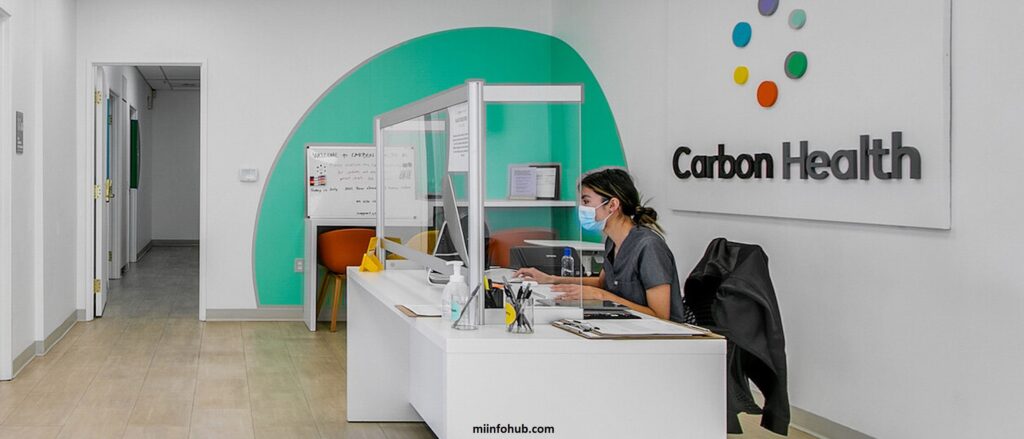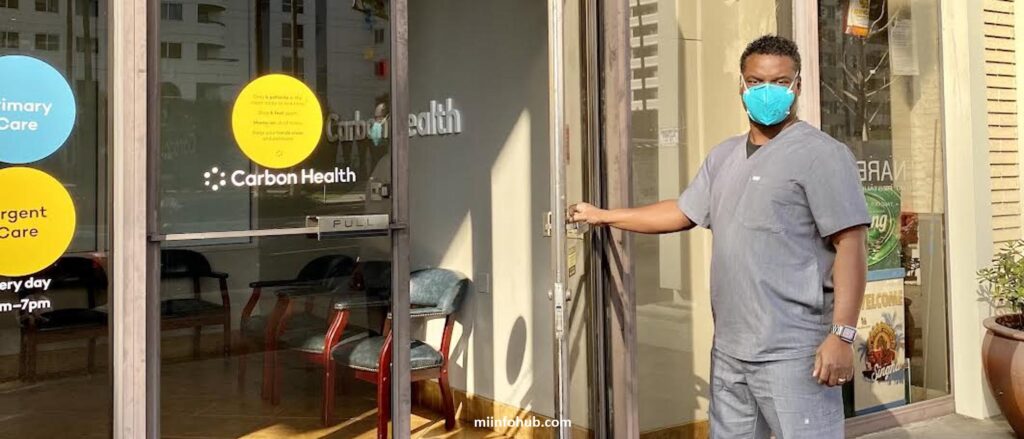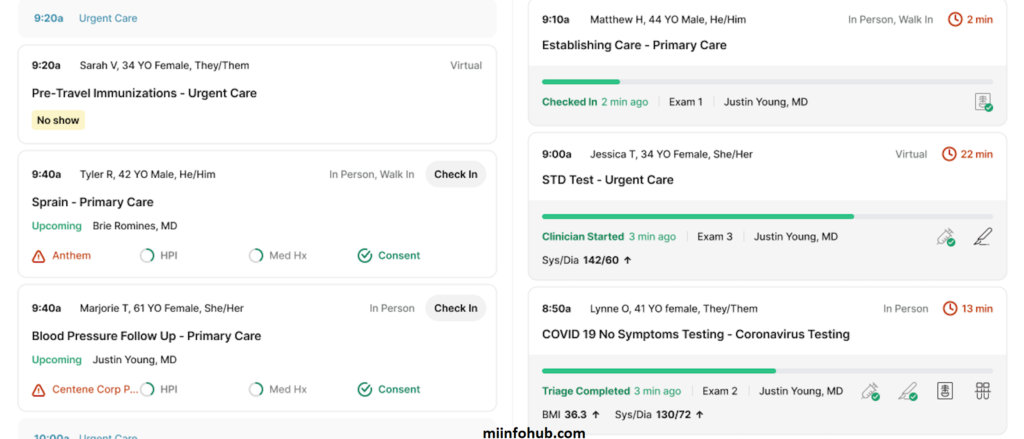Carbon Health is a growing healthcare provider that aims to make medical services accessible and affordable. They offer a range of services, including urgent care, primary care, and virtual health consultations. To ensure affordability, Carbon Health accepts a wide variety of insurance plans. Here’s an in-depth guide on what insurance Carbon Health takes, and other key details you should know.

Accepted Insurance Plans
PPO Plans
Preferred Provider Organization (PPO) plans are one of the most widely accepted insurance types at Carbon Health. PPO plans offer flexibility by allowing patients to visit any healthcare provider, without needing a referral. While patients can see both in-network and out-of-network providers, visits to in-network providers typically cost less due to pre-negotiated rates between the provider and the insurance company. If you want to know more about outpatient mental health treatment then click here.
- In-Network Benefits: Reduced costs, including lower co-pays and deductibles.
- Out-of-Network Coverage: Available but may incur higher costs.
- Common Providers: UnitedHealthcare, BlueCross BlueShield, Cigna, Aetna.
HMO Plans
Health Maintenance Organization (HMO) plans are also accepted at Carbon Health. However, these plans generally require that patients choose a primary care physician (PCP) who oversees all healthcare needs. To see a specialist or access certain services, a referral from the PCP is usually required.
- Primary Care Physician Requirement: A PCP is mandatory for managing and coordinating care.
- Referral Needed for Specialists: Patients need a referral to visit specialists.
- Lower Costs: HMO plans typically have lower premiums and out-of-pocket costs but less flexibility in choosing providers.
- Popular HMOs: Kaiser Permanente, Anthem BlueCross HMO.
Medicare
Carbon Health accepts Medicare at most of its locations, covering patients who are 65 or older or have certain disabilities. Medicare is a federal insurance program divided into different parts:
- Medicare Part A (Hospital Insurance): Covers inpatient hospital stays, care in skilled nursing facilities, and some home healthcare.
- Medicare Part B (Medical Insurance): Covers outpatient care, doctor services, preventive services, and medical supplies.
- Medicare Part C (Medicare Advantage): These are plans offered by private companies that include both Part A and Part B, often with additional benefits like vision and dental.
- Medicare Part D: Prescription drug coverage.
- Medicare Advantage Plans: Accepted at many Carbon Health locations, offering extra benefits like wellness programs.
Medicaid
Medicaid, the state and federally funded insurance program for low-income individuals, is accepted in select Carbon Health locations. Its plans cover a variety of medical services, but coverage details can vary by state. Therefore, it’s essential to confirm Medicaid acceptance before visiting.
- Eligibility: Based on income, family size, disability, and other factors.
- Comprehensive Coverage: Includes primary care, urgent care, lab tests, and in some states, specialist visits.
- State-Specific Coverage: Medicaid programs are state-run, meaning benefits and covered services vary by state.
- Examples of State-Specific Medicaid Programs: Medi-Cal (California), MassHealth (Massachusetts), NYS Medicaid (New York).
Employer-Sponsored Plans
If you’re covered by an employer-sponsored health insurance plan, there’s a good chance Carbon Health will accept it. These plans are offered through employers, often at reduced rates because the company shares the cost of premiums with employees. Carbon Health typically works with major insurance providers that offer employer plans.
- Broad Coverage: Includes PPO, HMO, and other plan types.
- Common Providers: Aetna, Anthem, Cigna, Humana.
- Flexible Coverage: These plans often cover preventive care, urgent care, and routine checkups, but you should always confirm specific coverage details with your provider and local clinic.

Other Insurance Plans
TRICARE:
Carbon Health may accept TRICARE, the healthcare program for military personnel, veterans, and their families. This plan includes coverage for both military treatment facilities and civilian healthcare providers.
Student Health Insurance Plans:
Carbon Health may also accept certain student health insurance plans, depending on the provider and the student’s school. Students should check with their university or insurance provider to ensure coverage.
COBRA:
For individuals between jobs, COBRA continuation health coverage may be accepted at Carbon Health locations. COBRA allows workers to retain their previous employer’s health insurance plan for a limited time after leaving a job.
Accepted Insurance Providers By State
Carbon Health’s accepted insurance providers can differ significantly depending on your location. Each state may have unique agreements with certain insurance carriers, meaning what’s accepted in one state might not be valid in another. For example, Medicaid coverage is highly variable across states, and some clinics may accept Medicaid while others do not. Additionally, Marketplace insurance plans and employer-sponsored plans may have state-specific network agreements. To avoid any confusion, it’s crucial to check directly with your local Carbon Health clinic or use the online insurance verification tool available on their website to confirm which insurance providers are accepted at your specific location. This ensures you have the most accurate information before your visit.

Does Carbon Health Accept Marketplace Insurance?
If you’ve purchased insurance through the Health Insurance Marketplace (Obamacare), there’s a possibility that Carbon Health accepts your plan. However, coverage depends on the specific insurance provider and the type of plan you select. Since Marketplace plans can have different network agreements across states, some locations may accept these plans while others may not. To avoid any unexpected costs, it’s important to verify whether your Marketplace plan is accepted by contacting your local Carbon Health clinic or using their online insurance verification tool before scheduling your visit.
How To Find Out If Carbon Health Accepts Your Insurance
It’s simple to verify whether Carbon Health accepts your insurance. Here are the steps:
- Online Portal: Visit Carbon Health’s website and use the online insurance verification tool. You can input your insurance details and get immediate feedback.
- Contact Your Clinic: You can also call your nearest Carbon Health clinic to ask directly about accepted insurance plans.
- Ask Your Insurance Provider: If you’re unsure, contact your insurance company and inquire about Carbon Health’s network status.
Out-Of-Network Insurance Options
If your insurance plan isn’t accepted at Carbon Health, you still have options. You may receive care as an out-of-network patient, although it’s important to note that these visits often come with higher costs. This is because your insurance company may not cover the full expenses of out-of-network services. However, Carbon Health maintains transparency in pricing and can offer cost estimates before your appointment, allowing you to understand potential out-of-pocket costs upfront. This ensures you have the necessary information to make informed healthcare decisions even without in-network coverage.

Services Covered By Insurance
Even if your insurance is accepted at Carbon Health, it’s important to check which specific services are covered under your plan. Most basic services like primary care, urgent care, and routine checkups are generally covered. However, more specialized services or tests might not always be fully covered by every plan. Here’s an overview of the key services available at Carbon Health:
Lab Tests
Carbon Health offers a wide range of lab tests, which can be an essential part of diagnosing and monitoring health conditions. These lab services typically include:
- Blood Tests: Common tests like complete blood counts (CBC), cholesterol panels, and blood sugar tests.
- Urine Tests: Used to detect infections, kidney problems, or other conditions.
- STD Tests: Screenings for sexually transmitted diseases, including HIV, gonorrhea, and chlamydia.
- Allergy Testing: Blood tests or skin tests to identify specific allergies.
X-Rays
Carbon Health clinics provide on-site X-rays for urgent care and injury diagnosis, such as broken bones, fractures, or lung conditions like pneumonia. Most PPO and HMO insurance plans cover X-rays, but the coverage level can depend on the reason for the test.
- Diagnostic X-Rays: Used to evaluate conditions like fractures, joint dislocations, and chest issues.
- Coverage Details: Some plans require pre-authorization for imaging services like X-rays, so it’s wise to confirm coverage beforehand.
Specialist Visits
While Carbon Health focuses on primary and urgent care, they can refer patients to specialists if needed. The availability of specialist visits is particularly relevant for patients with HMO plans, as a referral from a primary care provider is usually required.
- Referrals for Specialists: Carbon Health will coordinate care with external specialists for conditions that require advanced care (e.g., cardiology, dermatology, orthopedics).
- Insurance Coverage: Many insurance plans will cover specialist visits once a referral is obtained, but co-pays and deductibles may apply.
Vaccinations
Carbon Health provides a variety of vaccinations, which are generally covered by insurance as preventive care. Vaccines play a critical role in preventing diseases, and insurance plans usually cover these shots as part of routine healthcare.
- Routine Vaccinations: Includes flu shots, tetanus shots, and vaccines for measles, mumps, and rubella (MMR).
- Travel Vaccines: Vaccinations required for international travel (e.g., hepatitis, typhoid) may also be available.
- Childhood Immunizations: Essential vaccines for children, such as those for polio, chickenpox, and whooping cough, are often fully covered.
COVID-19 Testing
Carbon Health offers COVID-19 testing at various locations, often covered by insurance. There are several types of COVID-19 tests offered:
- PCR Testing: The most accurate test for active COVID-19 infection, typically covered by insurance.
- Rapid Testing: Offers faster results but may have limited accuracy. Coverage can vary based on the insurance plan.
- Antibody Testing: Used to determine if you have had a past infection. Some insurance plans cover it, but coverage varies, so it’s best to confirm.
Women’s Health Services
Carbon Health also provides women’s health services, which are typically covered under most insurance plans. These services aim to ensure comprehensive care for women, including preventive screenings and reproductive health.
- Pap Smears: Routine screening for cervical cancer, typically covered under preventive care.
- Breast Exams: Clinical breast exams and referrals for mammograms.
- Contraceptive Care: Including consultations and prescriptions for birth control options.
- Prenatal and Postnatal Care: Support and referrals for pregnancy-related care.
- STD Screenings: Testing and treatment for sexually transmitted diseases.
What If My Insurance Isn’t Accepted?
If Carbon Health doesn’t accept your insurance, you still have options. They offer affordable, transparent pricing for out-of-pocket payments. Here’s a snapshot of services and their costs:
- Urgent Care Visits: Set prices for walk-in visits.
- Virtual Care: Affordable telehealth consultations with transparent pricing.
Additional Tips for Insurance Use at Carbon Health
- Bring Your Insurance Card: Always carry your insurance card with you to make the check-in process smoother.
- Check Co-Pays and Deductibles: Ask about co-pay amounts before your visit, and make sure you understand how much your deductible is.
- Use the Carbon Health App: Carbon Health offers an app for scheduling, billing, and tracking your insurance details. It’s a convenient way to manage appointments and payments.

FAQs
1. Does Carbon Health accept my PPO insurance?
Yes, Carbon Health accepts most PPO insurance plans. However, always verify with your local clinic to ensure they accept your specific plan.
2. Does Carbon Health accept Medicare?
Yes, Medicare is accepted at most Carbon Health locations. This includes Medicare Part B, which covers outpatient services.
3. Is Medicaid accepted at all Carbon Health locations?
No, Medicaid is accepted only in select locations. Since Medicaid coverage varies by state, always check with your clinic or use their website to verify if they accept Medicaid in your area.
4. Can I use Health Insurance Marketplace plans at Carbon Health?
Carbon Health may accept Marketplace insurance plans, but it depends on the specific plan and state. Confirm with your clinic or use the online verification tool for clarity.
5. What if my insurance is out-of-network?
If your insurance is out-of-network, you can still receive care at Carbon Health. However, you might have higher out-of-pocket costs. Carbon Health provides transparent pricing for out-of-network patients.
Conclusion
Carbon Health is committed to making healthcare accessible and affordable by accepting a wide range of insurance plans. They work with PPO, HMO, Medicare, and Medicaid plans, along with employer-sponsored and Marketplace insurance options. To ensure your plan is accepted, always check with your local clinic or use Carbon Health’s online verification tools. Even if your insurance is out-of-network, Carbon Health offers transparent pricing for out-of-pocket visits. Take advantage of their services, whether through insurance or direct payments, for accessible and reliable healthcare.


